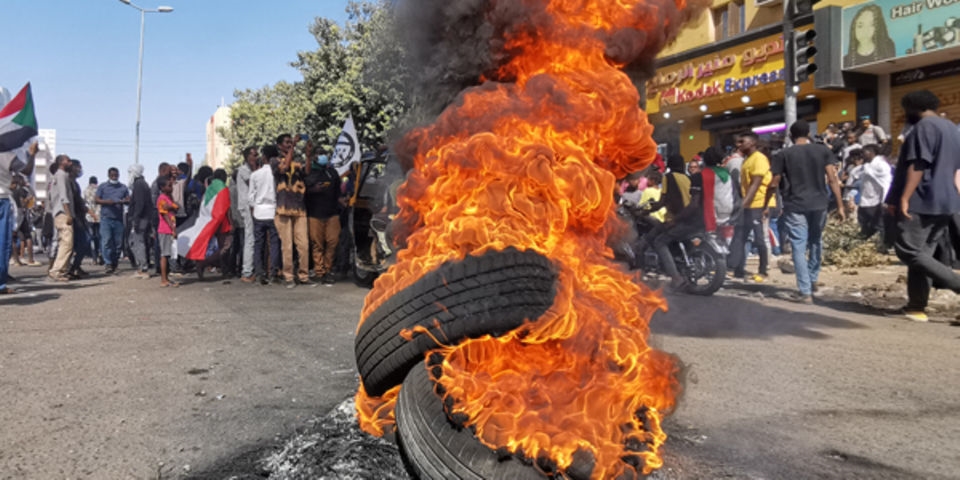Sudan: Two killed, others injured in protests
Demonstrations in Sudanese cities turn into confrontations with security forces.
-

Sudanese demonstrators protesting against military rule, January 6, 2022 (AFP)
Near the Presidential Palace in Khartoum, Sudanese security forces fired tear gas canisters on Thursday at demonstrators protesting the military's seizure of power over two months ago.
Eyewitnesses revealed that security forces tear-gassed protesters some 500 meters away from the Presidential Palace, where Lieutenant-General Abdel Fattah Al-Burhan is based.
The demonstrations, which are aimed to express rejection of Sudan's military rule, turned into violent confrontations between security forces and civilians in Khartoum and Omdurman.
كسر الطوق الامنى نحو القصر .#مليونية6يناير pic.twitter.com/bz9DPauA4b
— داليا الطاهر- Dalia Eltahir (@dalia_eltahir) January 6, 2022
الآن القوات الانقلابية تستخدم كامل ترسانتها العسكرية وعتادها الحربي ضد المتظاهرين العزل في شارع القصر وعدد من الاصابات بين الثوار@Sudan_Trending #مليونية6يناير pic.twitter.com/JqnbdRdfCC
— lord (@nubiankinglord) January 6, 2022
The Sudanese Doctors Committee announced that security forces shot two protesters dead.
Today's demonstration is part of a series of demonstrations in Sudan since the military announced the dissolution of the Sovereign Council last October, seizing the government.
Each demonstration is reporting a death count, in addition to injuries, as confrontations between authorities and civilians brew.
Sudanese Prime Minister Abdalla Hamdok announced his resignation last Sunday, saying that "the crisis in Sudan today is political, but it is on its way to becoming a comprehensive one."
"The transitional government was successful in resolving some issues and failed on some others, and our government was able to forgive many debts, and we had hoped to reduce 90% of our foreign debt. Our people achieved miracles when they had a united will," the Prime Minister noted.
According to Sudanese sources to CNN, Abdalla Hamdok's resignation came due to violations of agreements by the Sudanese military.
Hamdok had stated earlier that one of the primary conditions of the November 21 agreement was that he be autonomous in selecting political appointees in order to address the instability caused by the October 25 coup.
The relaunching of the General Intelligence Service (GIS) was another reason that drove him to resign, according to an important civilian leadership source.
It is worth noting that Hamdok had returned to head the government after a controversial agreement he signed with the Commander of the Sudanese Army, Abdel Fattah al-Burhan, on November 21.

 2 Min Read
2 Min Read








